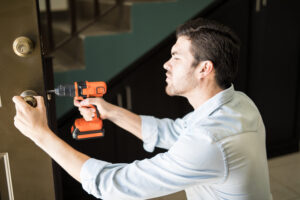When most people think of home security, they think of alarms, better locks, or more cameras. This causes them to overlook other, less obvious access points to their home.
These present opportunities to an enterprising burglar. Close these commonly overlooked holes in your home security before they are exploited.
Pet Doors
No one likes having to get up in the middle of the night to let their pet in or out. If your pet door doesn’t have its own set of locks, you could be letting in more than your dog or cat.
Burglars can use the pet door to open the interior lock on your front door. Prevent this by having an electronic pet door that responds to a sensor in your pet’s collar. They work by sensing when the dog is approaching and unlocking for them to pass.
You can also install your pet door in a wall as opposed to a door that can be unlocked.
Door Hardware
Speaking of doors, when did you last check the strength of your door hinges, door plate, or the door itself?
There’s no point in spending money for the best looks if other parts of the door are weak.
Doors At The Back, Side And Basement
The front door often gets all the attention. So much so, that homeowners tend to forget other exterior doors need to be just as secure too.
Back and side doors and doors to the basement can languish for years without having their locks changed or their overall integrity reviewed.
Ensure these doors are as secure as your front door.
Trimming Trees That Line Your Property
Having hedges and mature trees is a great way to increase the beauty and value of your property.
If your hedges aren’t trimmed regularly, they may be providing a hiding place for burglars. Tall trees may also provide access to the upper floor of your home. Cut overhanging branches to make sure they don’t reach.
Installing A Safe
If worst comes to worst, and your home is broken into, electronics aren’t the only valuables thieves are looking for.
Stealing your identity documents (passport, ID card, birth certificate) can also prove to be very lucrative for them. So can any cash or jewelry you may have at home.
Keep all of these items in a burglary proof safe.
Passwords For Online Accounts
Homeowners make the same mistake with their computers as they do with their front doors.
Their computer is outfitted with the latest antivirus and security tools. Yet the passwords to their bank and shopping accounts are written on a piece of paper next to it.
If burglars make it into the home, this can be an unexpected treasure trove for them. Use a secure online password manager like https://www.lastpass.com/ to store these.
Insuring Items Against Theft
Most anti-burglary measures are aimed at keeping thieves out. However, insurance is one of the best things you can have in case they get in.
When you have a suitable insurance policy in place, if items are stolen, you can recover their value through your policy and replace them.
Leaving Doors and Windows Unlocked
This one should be an obvious no-no. Surprisingly, many people do it. Some people do it because they’re expecting family members or friends who don’t have keys and won’t be around to let them in.
Others have simply grown careless because their neighborhood has never had a burglary problem.
This is a dangerous habit because there is a first time for everything. Even worse, many insurance policies are voided if burglars enter your home through an open door or window.
Remember to lock up!
Valuables On Display
When you have a lovely home, you want to show it off. What you don’t want is to put out a welcome mat for burglars.
Leaving your curtains or blinds open gives thieves an easy opportunity to scout for the items they want. Foil their plans by keeping them drawn.
Leaving Spare Keys Hidden On The Porch
Putting your spare keys in a hollowed-out stone or under a mat on your porch isn’t as clever a place to hide them as you may think.
This is one of the first places burglars will look for them. Alternative hiding places include a lockbox under the porch or in the garage.
We can help assess your home’s security and what you may need to make it less vulnerable. Why not give us a call at (305) 846-9360 to see what we can do for you.






